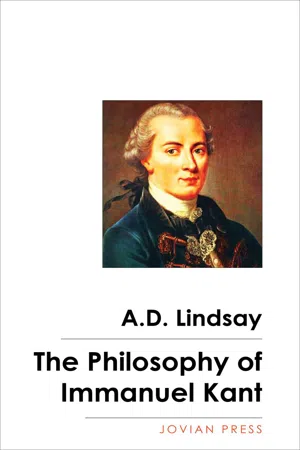
- 93 pages
- English
- ePUB (mobile friendly)
- Available on iOS & Android
eBook - ePub
The Philosophy of Immanuel Kant
About this book
It is a difficult matter, says Heine, "to write the life history of Immanuel Kant, for he had neither life nor history. He lived a mechanically ordered, abstract, old bachelor kind of existence in a quiet, retired alley in Königsberg, an old town in the north-east corner of Germany." The times he lived in were stirring enough. He was born in 1724, and died in 1804. He lived through the Seven Years' War that first made Germany a nation, he followed with sympathy the United States War of Independence, he saw the French Revolution and the beginning of the career of Napoleon. Yet in all his long life he never moved out of the province in which he was born, and nothing was allowed to interrupt the steady course of his lecturing, studying, and writing. "Getting up," continues Heine, "drinking coffee, lecturing, eating, going for a walk, everything had its fixed time; and the neighbours knew that it must be exactly half-past four when Immanuel Kant, in his gray frock-coat, with his Spanish cane in his hand, stepped from his door and walked towards the little lime-tree avenue, which is called after him the Philosopher's Walk." "Strange contrast," reflects Heine, "between the man's outward life and his destructive, world-smashing thoughts." As the political history of the eighteenth century came to an end when the French Revolution spilled over the borders of France and drove Napoleon up and down Europe, breaking up the old political systems and inaugurating modern Europe, so its opposing currents of thought were gathered together in the mind of a weak-chested, half-invalid little man in Königsberg, and from their meeting a new era in philosophy began...
Frequently asked questions
Yes, you can cancel anytime from the Subscription tab in your account settings on the Perlego website. Your subscription will stay active until the end of your current billing period. Learn how to cancel your subscription.
No, books cannot be downloaded as external files, such as PDFs, for use outside of Perlego. However, you can download books within the Perlego app for offline reading on mobile or tablet. Learn more here.
Perlego offers two plans: Essential and Complete
- Essential is ideal for learners and professionals who enjoy exploring a wide range of subjects. Access the Essential Library with 800,000+ trusted titles and best-sellers across business, personal growth, and the humanities. Includes unlimited reading time and Standard Read Aloud voice.
- Complete: Perfect for advanced learners and researchers needing full, unrestricted access. Unlock 1.4M+ books across hundreds of subjects, including academic and specialized titles. The Complete Plan also includes advanced features like Premium Read Aloud and Research Assistant.
We are an online textbook subscription service, where you can get access to an entire online library for less than the price of a single book per month. With over 1 million books across 1000+ topics, we’ve got you covered! Learn more here.
Look out for the read-aloud symbol on your next book to see if you can listen to it. The read-aloud tool reads text aloud for you, highlighting the text as it is being read. You can pause it, speed it up and slow it down. Learn more here.
Yes! You can use the Perlego app on both iOS or Android devices to read anytime, anywhere — even offline. Perfect for commutes or when you’re on the go.
Please note we cannot support devices running on iOS 13 and Android 7 or earlier. Learn more about using the app.
Please note we cannot support devices running on iOS 13 and Android 7 or earlier. Learn more about using the app.
Yes, you can access The Philosophy of Immanuel Kant by A. D. Lindsay in PDF and/or ePUB format, as well as other popular books in Psychology & Existential Psychology. We have over one million books available in our catalogue for you to explore.
Information
Table of contents
- THE IDEA OF CRITICISM
- KANT’S STATEMENT OF THE PROBLEM. SYNTHETICA PRIORI JUDGMENTS
- KANT’S IDEALISM. TIME AND SPACE
- THE CATEGORIES AND THE PRINCIPLES OF PURE UNDERSTANDING
- THE ANTINOMIES AND CRITICISM OF THE PROOFS OFTHE EXISTENCE OF GOD
- KANT’S MORAL THEORY
- THE “CRITIQUE OF JUDGMENT"—ÆSTHETICS AND TELEOLOGY